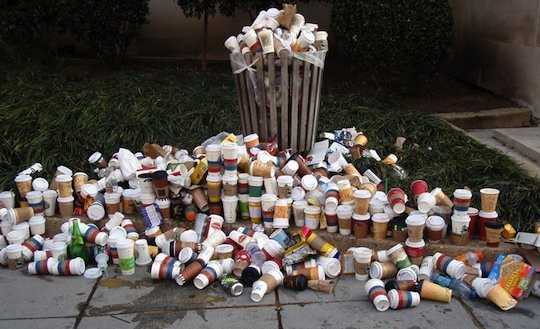LONDON, UK – The UK Parliament’s Environmental Audit Committee has launched an inquiry into the damage being caused by disposable drinks packaging – particularly the impact of plastic bottles and coffee cups.
The inquiry will look at what actions are being undertaken by industry and Government to reduce waste generated by coffee cups and plastic bottles, and investigate possible solutions.
According to the committee plastic bottles and coffee cups are particularly problematic with only around half of the 35 million plastic bottles sold in Britain every day being collected for recycling.
Some 7 million cardboard coffee cups were also said to be thrown away daily with just 1 in 400 arbeinge recycled.
The Committee explained that to make coffee cups waterproof the card must be fused with polyethylene, a material that cannot be separated out again in standard UK recycling mills.
This coating makes both composting and recycling of paper cups uncommon. There are only two sites in the UK that have the capacity to separate the plastic film from the paper, allowing recovery and recycling into new paper products.
Successive Governments have put regulations in place to reduce waste and to increase recycling.
Similarly, the industry has been taking voluntary action to try to increase their recycling rates and exploring recyclable alternatives to coffee cups, with the creation of stakeholder groups such as the Paper Cup Recovery and Recycling Group.
“Our throwaway society has given us a tide of litter on our beaches, dead seabirds and fish, and plastic in our food,” commented Mary Creagh MP and Committee member.
“We all enjoy a take away coffee or tea, but the cups they are served in are particularly difficult to recycle because they combine plastic coating and cardboard. Our inquiry will be taking a serious look at solutions like the use of different materials, behaviour change, better recycling and bottle deposit return schemes.”
Terms of Reference:
Impact
- What is the environmental impact of waste from coffee cups and plastic bottles? Are the rates of use, collection levels and recycling levels of these products increasing or decreasing over time?
- What are the challenges of recycling these products? What obstacles have prevented greater progress in increasing recycling rates?
Progress
- Are consumers aware of the complexities of recycling these products? How could we increase awareness amongst the public and what impact would this have?
- What actions are being untaken by industry to reduce waste generated by coffee cups and plastic bottles? How effective have these initiatives been? How could the Government better support these initiatives?
- How effective, to date, have Government and local government led initiatives (such as #1MoreShot) been at reducing waste and increasing the recycling of coffee cups and plastic bottles? What progress has been made to develop a viable, recyclable alternative to the polyethylene coated paper cup? What are the pros and cons of the use of such cups?
- What is the likely impact of leaving the EU on UK efforts to reduce coffee cup and plastic bottle waste?
Solutions
- What initiatives could be utilised to reduce coffee cup and plastic bottle waste or to lessen the impact of this waste? In particular what are the opportunities and risks associated with:
- Incentives to encourage the use of re-usable alternatives for these products.
- Charge, taxes, deposits or levies on the use of these products.
- How can we encourage households, businesses, food and drink outlets, and offices to change behaviours or introduce policies to reduce their coffee cup and plastic bottle waste?
- How are other countries working to reduce coffee cup and plastic bottle waste? What examples of best practice are there that the UK could learn from?
The Committee would grateful to receive written submissions by Wednesday 5 April.
Written evidence can be submitted through the disposable packaging: coffee cups and plastic bottles inquiry page.
Ben Messenger
















